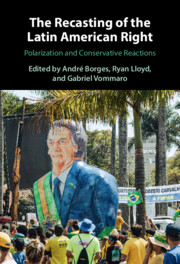Book contents
- The Recasting of the Latin American Right
- The Recasting of the Latin American Right
- Copyright page
- Contents
- Figures
- Tables
- Contributors
- Introduction
- Part I Building Right-Wing Parties and Partisans
- Part II A New Right? Ideational and Programmatic Change after the Left Turn
- 6 Progressive Policy Change, Cultural Backlash, and Party Polarization in Latin America
- 7 The Latin American Populist Radical Right in Comparative Perspective
- 8 Between Gattopardismo and Ideational Change
- 9 Whose Right, Whose Left? Analyzing the Complexities of Right-Wing Politics in Venezuela
- 10 A Conversion to the Right
- Conclusions
- References
- Index
Conclusions
Reassessing the Resurgence of the Latin American Right
from Part II - A New Right? Ideational and Programmatic Change after the Left Turn
Published online by Cambridge University Press: 29 November 2024
- The Recasting of the Latin American Right
- The Recasting of the Latin American Right
- Copyright page
- Contents
- Figures
- Tables
- Contributors
- Introduction
- Part I Building Right-Wing Parties and Partisans
- Part II A New Right? Ideational and Programmatic Change after the Left Turn
- 6 Progressive Policy Change, Cultural Backlash, and Party Polarization in Latin America
- 7 The Latin American Populist Radical Right in Comparative Perspective
- 8 Between Gattopardismo and Ideational Change
- 9 Whose Right, Whose Left? Analyzing the Complexities of Right-Wing Politics in Venezuela
- 10 A Conversion to the Right
- Conclusions
- References
- Index
Summary
In the conclusion, we review the book’s chapters and argue that Latin America has experienced a resurgence of conservative forces in recent years. We analyze the supply and demand of a broad set of conservative alternatives, paying special attention to the processes of party-building, adaptation, and rebranding. We find that new right-wing forces often have weak organizations, but have been able to mobilize voters along noneconomic cleavages, including security, gender politics, and reproductive rights. The adoption of a highly conservative profile has allowed parties to access lower-class constituencies and mobilize mass support among them. The politicization of cultural issues, such as LGBT rights and religious identities, has contributed to polarization and the rise of populist radical right parties. These parties have flourished within the context of political and economic shocks and benefited from cultural backlashes and the crises of traditional right-wing parties. In these situations, politics becomes a zero-sum game and the stakes get higher. Democratic stability in the region is arguably at its most tenuous state since the age of military dictatorships. Interrupted presidencies have become realities in many countries over the past fifteen years, raising concerns about democratic stability and potential threats to democratic institutions.
Keywords
- Type
- Chapter
- Information
- The Recasting of the Latin American RightPolarization and Conservative Reactions, pp. 237 - 246Publisher: Cambridge University PressPrint publication year: 2024

